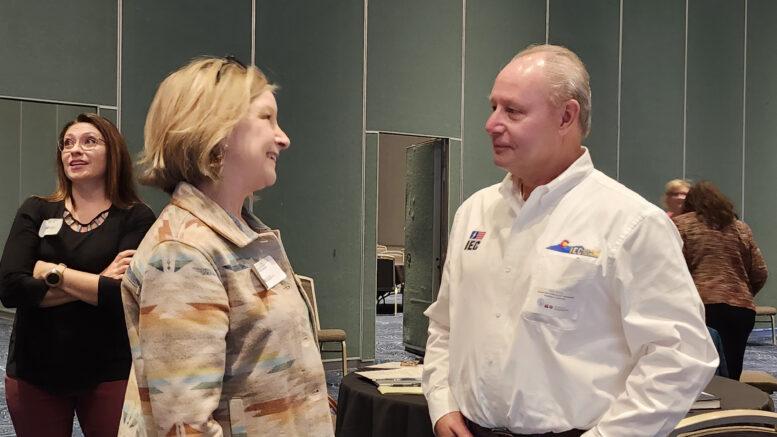The question was a complex one: How do you convince more kids in southeast Colorado that careers in construction, manufacturing and other fields that don’t require four-year college degrees can be both lucrative and fulfilling?
Noting their annual salaries, as well as the need for such workers that will keep them in demand, was the way to pitch them on a statistical basis, numerous attendees at Wednesday’s Opportunity Now Regional Talent Summit in Pueblo said. But explaining the fulfilling nature of a vacancy-heavy job like a heavy equipment operator might take a little more storytelling, all agreed — and Baca County Economic Development Commission Executive Director Pj Chenoweth thought she had a plan.
“We need earlier engagement — like, say, middle school,” Chenoweth suggested to a breakout session specifically discussing how to increase the pipeline of construction jobs. “Do these students even know that they can make a living on heavy equipment, like playing with extra-large Tonka Trucks?”
In one fell swoop, Chenoweth captured the essence of what leaders from three sectors — construction, technology and advanced manufacturing — said needed to be done to fill significant talent shortages in a 13-county area ranging from Leadville to Springfield. And her idea, bundled with those from about 65 other people who attended the third of the planned seven regional talent summits to improve Colorado’s workforce-development system, will be part of a detailed plan set to come out late this year.
Developing talent in southeast Colorado

Attendees listen to a speaker Wednesday at the Opportunity Now Regional Talent Summit in Pueblo.
For that part of the state, where trades jobs are abundant but candidates fewer — either because graduates don’t have the needed skill sets or because homegrown students are looking to other areas — a key to growing workforce is selling opportunities, attendees said. That means getting businesses into high schools and even middle schools to explain potential career paths, work with educators to develop curricula and even spend a couple of hours a month teaching classes in the professional areas where they have expertise.
Because so many companies that can offer careers are smaller firms, asking their leaders to give up workers to advocate their cause to multiple school districts over expansive rural areas isn’t reasonable, noted Greg Anzlovar, project manager for A-Var Electric of Pueblo. Thus, he and others agreed, a new type of industry consortium is needed.
Tracy Gutierrez — senior program manager for Southern Colorado Economic Development District, which hosted the event for the Colorado Office of Economic Development and International Trade — interjected that groups like hers could serve as conveners. A convener could be the point of contact for area school districts, finding out if they need teachers, equipment or participants in career fairs and then could contact business leaders from various sectors to participate.
That idea was just one of multiple proposals put forward at the summit Wednesday at the Pueblo Convention Center that economic-development leaders will flesh out before including in two- and five-year regional plans that will be released in December. And then business operators, business groups, educational leaders and other participants will work to bring the ideas to reality and ease the talent shortages that business leaders have identified as their second-biggest obstacle to growing in Colorado.
What are these talent summits?

Construction leaders discuss ways to develop more craft laborers and technicians at Wednesday’s Opportunity Now Regional Talent Summit in Pueblo.
“This has been a labor of love, and we’re really excited to have you all here,” Gutierrez said.
The regional-talent-summit initiative sprang from a 2023 report by the business-focused Education to Employment Alliance, which sought to identify ways to get learners the skills they need to fill business leads and launch good-paying careers. Organizations like the Colorado Chamber of Commerce and Colorado Succeeds pushed a bill in 2024 to launch the summits, which began in February in Greeley and will continue through mid-June with events in Grand Junction, Durango, Edwards and Colorado Springs.
Finding ways to partner businesses with K-12 schools, colleges and workforce training centers is key because that allows them to explain the skills they need and contribute resources to bring them about in future workers. But that was not the only idea that participants espoused at the event.
Manufacturing and technology leaders, who often shared the same concerns, said they want to lean on currently underutilized state programs to increase the number of on-the-job training opportunities like apprenticeships and internships that they can offer. They also said the rural area would benefit from creation of a workforce-training program specifically in agricultural tech, which both can help to retain and attract workers and can boost the output of area farms.
New plans can draw on existing programs

Eve Lieberman, executive director of the Colorado Office of Economic Development and International Trade, speaks at Wednesday’s Opportunity Now Regional Talent Summit in Pueblo.
Construction-related ideas, heavy on the idea of changing a culture that has spent 40 years promoting college degrees as a lone path to success, included growing pre-apprenticeship programs that let high-school students work part-time to discover industries. Area companies also could work together to develop shared training programs so that individual employers don’t have to bear the costs alone, and they suggested school success metrics must reach beyond standardized testing to acknowledge trades preparation.
Participants heard about several examples of programs they could replicate. Madison Tortessi, director of career and technical education for Canon City Schools, explained that district’s students choose a career pathway their freshman year and must complete at least one internship before graduation. And Rhonda Epper, president of Trinidad State College, described a campus the school is developing in unused former K-12 school space to house startups and to train underutilized workers for in-demand careers.
“What I hear regularly from employers is they are not finding the talent they need to grow in Colorado,” OEDIT Executive Director Eve Lieberman told the crowd. “Today the real work starts. We want to develop those solutions to meet employers now and future-proof for the schools they need.”
The next summit is scheduled for May 12 at the Mesa County Workforce Center, with a focus on construction, early childhood education and health care. Business and educational leaders interested in attending can reach out to the Grand Junction Area Chamber of Commerce or to OEDIT.
